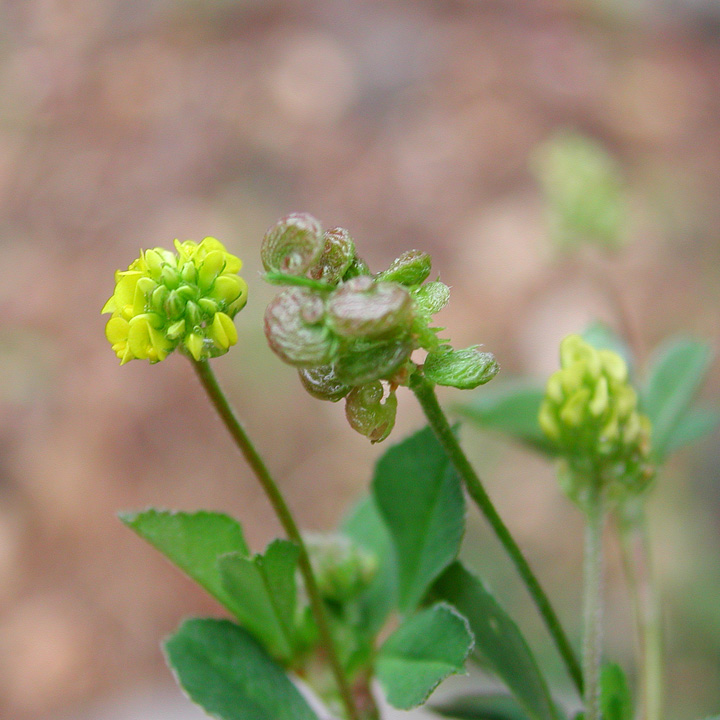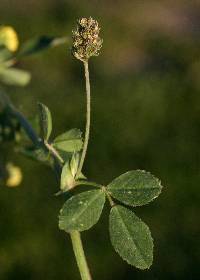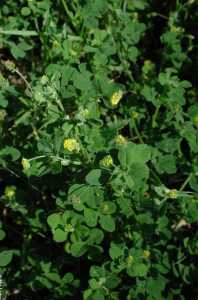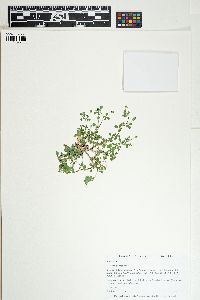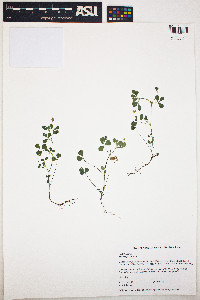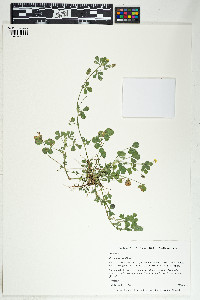|
Family: Fabaceae
black medick
[Medicago lupulina var. glandulosa W.D.J.Koch] |
Annual or biennial with prostrate or ascending stems to 8 dm; stipules lanceolate, entire or toothed; lfls elliptic to obovate, 1-2 cm; peduncles much exceeding the subtending lvs; heads globose to short-cylindric, to 1 cm; fls yellow, 10-50 per head, 2-4 mm; pods nearly black, 2-3 mm, reniform, unarmed, 1-seeded, the conspicuous veins tending to be longitudinal; 2n=16. Native of Eurasia, common as a weed in our range and elsewhere. May-Sept.
Gleason, Henry A. & Cronquist, Arthur J. 1991. Manual of vascular plants of northeastern United States and adjacent Canada. lxxv + 910 pp.
©The New York Botanical Garden. All rights reserved. Used by permission. Kearney and Peebles 1969, McDougall 1973 Duration: Annual Nativity: Non-Native Lifeform: Forb/Herb General: Herbaceous annuals or perennials, to 60 cm tall, stems several, prostrate to decumbent or ascending, branching from the base, herbage pubescent to finely strigose. Leaves: Alternate, pinnately trifoliate, leaflets obovate to suborbicular, 6-15 mm long, margins denticulate, at least on the upper half, stipules lance-ovate, entire or few-toothed, petioles 2-15 mm long. Flowers: Yellow, very small, with banner, wing, and keel petals (papilionaceous), 2 mm long or less, keel petal shorter than the wing or banner petals, calyx tube campanulate with subequal teeth, villous, stamens diadelphous (9 fused, 1 free), flowers numerous, borne in ovoid, spike-like racemes, these becoming oblong in fruit, peduncles 10-25 mm long, (usually exceeding the leaves). Fruits: Pods kidney-shaped, 1-2 mm long, coiled in 1 plane, strongly veined, black when ripe, surfaces glabrous, not prickly. Seeds 1 per pod. Ecology: Found in disturbed areas, roadsides, and lawns, from 2,500-8,000 ft (762-2438 m); flowering March-September. Distribution: Widespread throughout North America. Notes: The tiny yellow flowers and kidney-shaped, unarmed seed pods coiled in 1 plane help identify this species. Naturalized from Europe. Ethnobotany: There is no use recorded for this species, but other species in this genus have uses. Etymology: Medicago is derived from Medike, or medick, the Greek name for alfalfa, which came to Greece from Medea, while lupulina means hop-like. Synonyms: Medica lupulina Editor: LCrumbacher 2012 |

